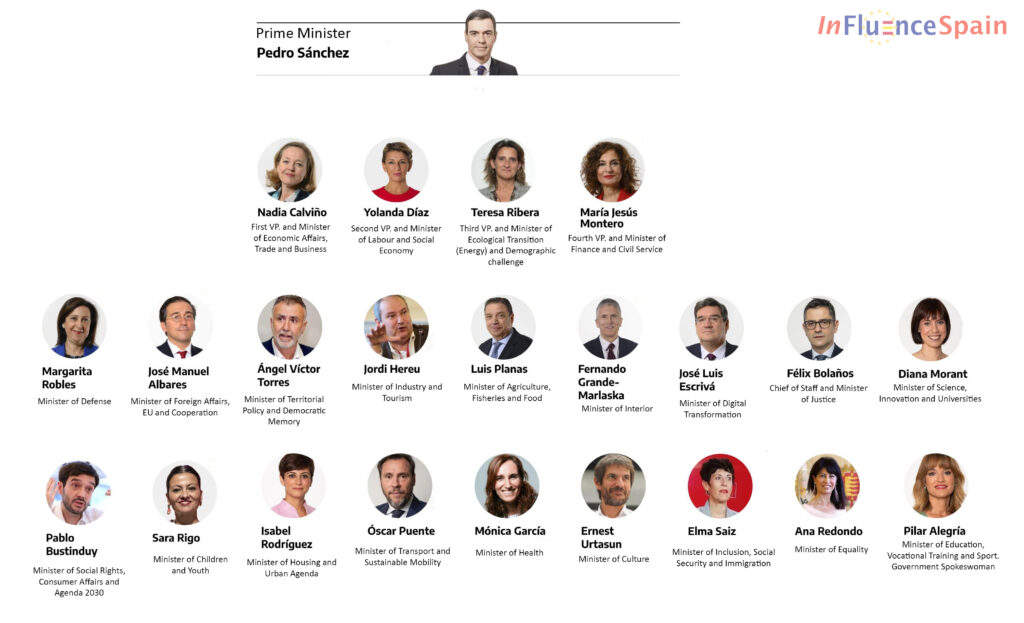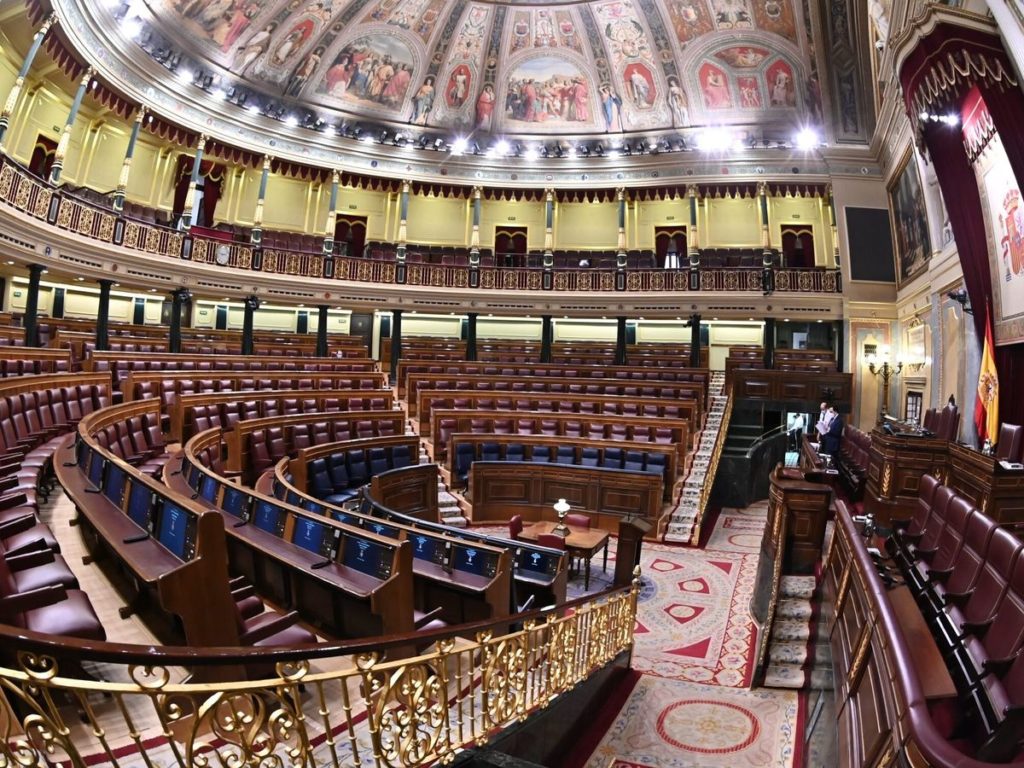
By: Sebastian Mariz, Managing Director of Influence Spain
.
As we predicted, at the beginning of October, Mr. Pedro Sánchez has managed to muster enough support from a splintering of minority parties in the national Parliament to form a new coalition Government with the new communist party, SUMAR. In the investiture vote, which took place on Thursday the 16th of November, he received 179 votes in favour, to 171 votes against. The result reflects an almost even split in Parliament between leftist and regionalist parties in favour of a Mr. Pedro Sánchez Government for the next four years, and the conservative and far-right votes against. This split has spilled onto the streets with hundreds of thousands of voters protesting in provincial capitals across the country against the concessions made by Mr. Sánchez, to the communists and the smaller regionalist parties, in exchange for their support.
Concessions to the regions
As we also predicted back in October, these concessions include tabling a law on amnesty for the exiled Catalan political leaders who orchestrated the failed referendum on Catalan independence in 2017. This draft law, which was tabled on Monday the 13th of October, now has to go through the parliamentary adoption process with two readings in the Parliament and the Senate and will likely come under careful scrutiny by both the Constitutional and Supreme Courts. Failure to adopt it, will mean the agreement between the Catalan pro-independence, the conservative Junts party and Mr. Pedro Sánchez will be broken, and parliamentary support from the 7 Junts Members of Parliament lost, leaving Mr. Sanchez shy of four seats to get legislation passed and will open up the possibility of new general elections.
Of equal importance, Mr. Sánchez and his Catalan coalition partners have agreed to negotiate substantial changes to the Statute governing relations between the Catalan Government and the central Government, fiscal autonomy in Catalonia and the organization of a referendum on independence authorized by the King and Central Government, agreed on by an absolute majority of MPs in the national Parliament and open to all Spaniards. Mr. Sánchez has also agreed to a 15 billion euros haircut to Catalonia’s public debt owed to the Central Government, joint control over regional train services and increased budget transfers to Catalonia in the areas of R&D, study grants and scholarships, judicial institutions, prisons and education.
This haircut to Catalonia’s debt with the central Government will be extended to the rest of Spain’s 17 regions, which together owe the State almost 192 billion euros, or 20% of Spain’s GDP. If Mr. Sánchez applies the same haircut percentage to the rest of the regions, the central Government will have to foot the bill for an additional 24 billion euros in regional debt, making the total cheque made out to the regions equal to more than 39 billion euros or 3% of Spain’s GDP. This commitment will undoubtedly have an impact on Spain’s public debt and deficit figures and its commitment to the EU stability and growth pact.
In addition, Mr. Sánchez has also agreed to negotiating new changes to the Statute governing relations with the Basque Country and Galicia, recognising the national and distinctive identity of both of these regions and opening the door to possible negotiations on new forms of autonomy in both regions.
In the case of the Basque Country, MR. Sánchez has agreed to grant the Basque Country full control over social dialogue agreements and collective bargaining affecting all workers and companies residing in the Basque Country, control over regional train services, and negotiations on a possible opt-out of the Basque Country from the national social security and pension scheme. Interestingly, Mr. Sánchez has agreed to restrict his use of the Royal Decree Laws to pass controversial legislation and will only do so after consulting with his Basque coalition partners. This commitment has also been included in the agreement signed with Coalición Canaria from the Canary Islands.
Coalition agreement with SUMAR
Ms. Yolanda Díaz, the acting Minister of Employment and leader of the new communist coalition, SUMAR, will repeat as Minister of Employment and as 2nd Deputy Prime Minister, and lead the junior partner in the coalition. In exchange for her 31 seats in Parliament, Sánchez has agreed to the following policy/legislative agenda:
- Employment reforms: toughening worker dismissal rules, reducing the work week to 38.5 hours in 2024 and 37 hours in 2025, and adopting new increases in the minimum wage.
- Energy: modifying the spot market so that the margins generated from renewable energy plants are re-invested into reducing final electricity bills to households and SMEs; simplifying administrative requirements for the installation of new renewable energy plants while taking into account special environmental and agricultural zones; remove any remaining administrative barriers to self-generation of electricity and creating a new national energy regulator; and doubling the number of households benefitting from subsidised electricity and gas rates.
- Waste management: adoption of a sustainable consumption plan and a Law on Food Waste.
- Public pensions and social security: maintaining the indexation of public pensions to inflation rates.
- Real estate and mortgages: negotiating new mortgage relief mechanisms with financial entities, which include payment in kind in the event of mortgage defaults and modifying the mortgage market to allow homeowners to transfer their mortgages to another bank; subsidising the energy efficiency transformation of at least 500,000 homes and buildings, and increasing the social housing stock.
- Fiscal Policy: maintaining and prolonging the extraordinary taxes on the financial and energy sectors; Increase the fiscal burden on households and SMEs to the EU average of 46%; modifying the polluter pays principal; and eliminating fiscal credits to large corporations so that the real rate of corporate tax is 15%.
New Cabinet

Mr. Sánchez has decided largely on continuity in the formation of his new Cabinet, maintaining the same number of ministries with only minor changes to his Cabinet.
His Chief of Staff, MR. Félix Bolaños will maintain responsibility for coordinating relations with the coalition partners and negotiating the approval of new legislative initiatives and national budget, and will now also be responsible for relations with the Courts of Justice, as the new Minister of Justice.
Ms. Nadia Calviño will continue to be the Deputy Prime Minister and be in charge of the country’s economic and finance policy. She will also Chair the weekly Council of Ministers, but has transferred the digitalisation policy to a new Ministry of Digitalisation, run by MR. José Luis Escrivá, the former Minister of Inclusion and Social Security. Ms. Elma Saíz, a member of the Socialist Party from the region of Navarra, is now the new Minister of Inclusion and Social Security.
Ms. Teresa Ribera and MS. María Jesús Montero repeat as Energy Minister and Fiscal Affairs Minister, respectively.
Transport, Mobility and Housing have been split into two ministries. Transport and Mobility led by a new Minister, Mr. Oscar Puente, a member of the Socialist Party and former Mayor of the city of Valladolid, and Housing led by Ms. Isabel Rodríguez, the former Spokeswoman for the Socialist Party Group in the Parliament.
Consumer Affairs and Industry/Tourism also have new ministers. Mr. Pablo Bustinduy, a former member of the communist Podemos Party is now a member of the Sumar Party and will run Consumer Affairs; and Mr. Jordi Hereu, Mayor of Barcelona between 2006 and 2011, will run Industry/Tourism.
Science and Universities have been reunited and will continue to be run by Ms. Diana Morant and Healthcare will be run by MS. Mónica García, the leader of the communist Más Madrid Party and former opposition leader in the region of Madrid.
.
Every month, Influence Spain provides a look at Spanish current affairs. For more information, join our social media profiles on Twitter and LinkedIn.

